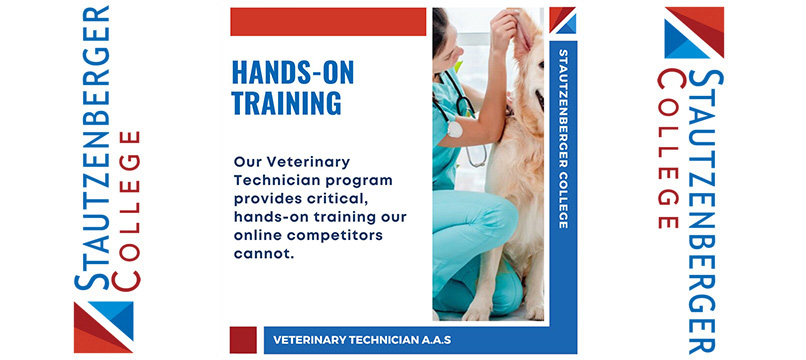Why Hands-on Veterinary Technician Campus-based classes are better than online
 Why Hands-on Veterinary Technician Campus-based classes are better than online
Why Hands-on Veterinary Technician Campus-based classes are better than online
Veterinary technicians typically work in private clinics and animal hospitals. They assist veterinarians in tasks such as conducting exams, administering medications and injections, and performing laboratory tests. If you are interested in becoming a veterinary technician, you will need to complete a two-year associate degree and pass a credentialing exam. You will also need to complete an externship, which is a campus-based program, and will be set up for you.
The career outlook for veterinary technicians is expected to grow much faster than the average for other occupations, so it’s an excellent career to pursue. According to the Bureau of Labor Statistics, positions in this field are predicted to grow by 20% during this period, compared to just 5% on average for other careers.
When you are choosing an institution where you will earn your degree, look for one that offers in-person classes rather than virtual ones. For some careers, virtual learning may be effective. But as a prospective veterinary technician, hands-on campus-based classes help prepare you for your duties better than online studying can.
Here are some reasons why campus-based classes are better:
You will be able to gain real-world experience.
Learning the technical skills you need as a veterinary technician is essential, but hands-on, campus-based experiences provide the real-world scenarios you need. Being a veterinary technician involves working in an environment that can be fast-paced, noisy, and challenging, and hands-on experience is the only thing that lets you truly understand the circumstances and conditions you will be working in.
You will make connections that could help you secure a position.
When you are close to finishing or have completed your educational requirements to become a veterinary technician, the next step is to secure employment in the field. This is usually easier for students who graduate from a traditional campus-based program. Instead of the isolation that is common with online learning, you will be able to network with local veterinary businesses that know your school and program and may have already hired some of its graduates. In addition, your fellow students may be your co-workers in the future, and hiring managers who have attended the same campus may prioritize hiring a graduate of the same program.
You will learn valuable additional skills.
A veterinary technician’s duties go far beyond the needed technical skills. You will need to be a good communicator with your co-workers as well as with pet owners. You will also need to be compassionate when interacting with sick pets and their owners and be able to give owners information about their pets' care and well-being. These important skills cannot be learned and honed online but instead require hands-on training.
You will have access to related technology and diagnostic equipment.
Veterinary employers place a premium on applicants who are already familiar with using standard technology and diagnostic equipment. These will be available to you if you are taking campus-based classes, but you will miss this hands-on experience with online classes. This access and experience give on-campus students an advantage when they enter the job market.
Veterinary technicians can have satisfying, meaningful careers that allow them to work with animals while performing clinical duties. When you are choosing a two-year program to prepare for this career, hands-on, campus-based classes offer distinct advantages over online studying.
#college #vettech #vettechstudent #vettechschool #sctoday

